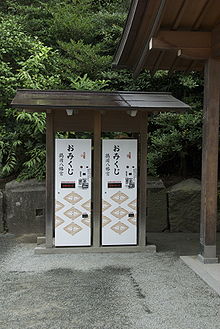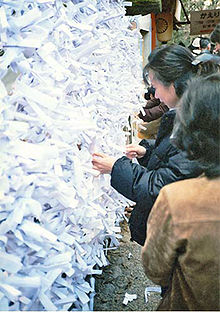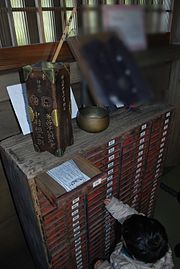- Omikuji
-
Omikuji (御御籤, 御神籤, or おみくじ) are random fortunes written on strips of paper at Shinto shrines and Buddhist temples in Japan. Literally "sacred lot", these are usually received by making a small offering (generally a five-yen coin as it is considered good luck) and randomly choosing one from a box, hoping for the resulting fortune to be good. (As of 2011[update] coin-slot machines sometimes dispense omikuji.)
The omikuji is scrolled up or folded, and unrolling the piece of paper reveals the fortune written on it. It includes a general blessing which can be any one of the following:
- Great blessing (dai-kichi, 大吉)
- Middle blessing (chū-kichi, 中吉)
- Small blessing (shō-kichi, 小吉)
- Blessing (kichi, 吉)
- Half-blessing (han-kichi, 半吉)
- Future blessing (sue-kichi, 末吉)
- Future small blessing (sue-shō-kichi, 末小吉)
- Curse (kyō, 凶)
- Small curse (shō-kyō, 小凶)
- Half-curse (han-kyō, 半凶)
- Future curse (sue-kyō, 末凶)
- Great curse (dai-kyō, 大凶)
It then lists fortunes regarding specific aspects of one's life, which may include any number of the following among other possible combinations:
- 方角 (hogaku) - auspicious/inauspicious directions (see feng shui)
- 願事 (negaigoto) – one's wish or desire
- 待人 (machibito) – a person being waited for
- 失せ物 (usemono) – lost article(s)
- 旅立ち (tabidachi) – travel
- 商い (akinai) – business dealings
- 學問 (gakumon) – studies or learning
- 相場 (souba) – market speculation
- 爭事 (arasoigoto) – disputes
- 戀愛 (renai) – romantic relationships
- 転居 (tenkyo) – moving or changing residence
- 出產 (shussan) – childbirth or pregnancy
- 病気 (byōki) – illness
- 縁談 (endan) – marriage proposal or engagement
 An omikuji vending machine at Tsurugaoka Hachiman-gū
An omikuji vending machine at Tsurugaoka Hachiman-gū
The omikuji predicts the person's chances of his or her hopes coming true, of finding a good match, or generally matters of health, fortune, life, etc. When the prediction is bad, it is a custom to fold up the strip of paper and attach it to a pine tree or a wall of metal wires alongside other bad fortunes in the temple or shrine grounds. A purported reason for this custom is a pun on the word for pine tree (松 matsu) and the verb 'to wait' (待つ matsu), the idea being that the bad luck will wait by the tree rather than attach itself to the bearer. In the event of the fortune being good, the bearer has the option of tying it for the fortune to have a greater effect or can keep it for luck. Though nowadays this custom seems more of a children's amusement, omikuji are available at most shrines, and remain one of the traditional activities related to shrine-going, if lesser.
Compare perhaps the custom of writing a prayer on a specially-prepared wooden block called an ema, which is then tied to an ad hoc scaffold.
Relation to fortune cookies
The random fortunes in fortune cookies may be derived from omikuji; this is claimed by Seiichi Kito of Fugetsu-Do,[1] and supported by evidence that (American) fortune cookies derive from 19th century Kyoto cookies.[2]
See also
References
- ^ A History of Fugetsu-Do, www.fugetsu-do.com
- ^ Lee, Jennifer 8. (January 16, 2008). "Solving a Riddle Wrapped in a Mystery Inside a Cookie" "feb 24 2004 how to see your fortune the fortune cookie" The New York Times. Retrieved on January 16, 2008.
Categories:- Divination
- Shinto
- Japanese religions terms
- Japanese words and phrases
Wikimedia Foundation. 2010.


